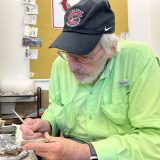February Research Highlights STEM education and activism, plus new research in Physics, Biology, and Environmental Sciences
February 27, 2024
There’s an explosion of new research in the month of February from students, postdoctoral scholars and faculty in the Schmid College of Science and Technology. Among the new papers:
Desiree Forsythe, a Grand Challenges Initiative postdoctoral fellow, has published a new study in the Journal of Higher Education. Titled Committing to Racial Justice as a White Woman in STEM: Using Constructivist Grounded Theory to Explore White Activism, the research explores how to empower women in science and engineering to create a more equitable and inclusive future for the field. Forsythe will join the faculty at Santa Clara University as an assistant professor of biology this coming fall.
Citlalli Madrigal ’24 and Rama Bedri ’24, undergraduate students studying Environmental Science and Policy, have published a paper titled Water Whiplash in the Mediterranean Regions of the World. The paper is co-authored with Chapman faculty Hesham El-Askary and Thomas Piechota, as well as senior research associate Wenzhao Li. The study explores nearly 100 years of streamflow records across five continents.
Andrew Jordan, the newly appointed Kennedy Chair in Physics, is among the co-authors of a new study titled Programmable Heisenberg interactions between Floquet qubits in the prestigious journal Nature Physics. The study, led by scientists from Lawrence Berkeley National Laboratory and UC Berkeley, also includes Bibek Bhandari and Debmalya Das from the Institute for Quantum Studies.
Emma Kocik ’22, now a doctoral student in earth and environmental sciences at University of Pennsylvania, has led a new study with Senior Associate Dean Christopher Kim and others in the journal Applied Geochemistry. The study is titled Sulfate enhances the adsorption and retention of Cu(II) and Zn(II) to dispersed and aggregated iron oxyhydroxide nanoparticles. Kocik, who was Chapman’s first Beckman Scholar, was supported in her research by the Beckman Foundation.
Brian Hoover and Professor of Biology Walter Piper have published a new study from ongoing research on common loons in northern Wisconsin. The study, published in the journal Animal Behavior, demonstrates that the call of male loons changes predictably as the birds age. This indicates that a bird’s call is an honest signal of age and therefore ability to defend territory. The study is titled Honest signalling of age in a territorial breeder. Hoover collaborated with Piper as a Grand Challenges Initiative Postdoctoral Fellow and is now a principal scientist for the non-profit Farallon Institute.
Assistant Professors of Biology Jeremy Hsu and Hagop Atamian, with contributions from Kate Avendano-Woodruff ’25, have published a new paper describing curriculum in plant biology in the Journal of Microbiology and Biology Education. The paper, titled Promoting student interest in plant biology through an inquiry-based module exploring plant circadian rhythm, gene expression, and defense against insects, presents a weeklong curricular module for high school biology students that promotes knowledge of phytohormones, the circadian clock, and the Central Dogma. The work was funded by a grant from the American Society of Plant Biologists.

